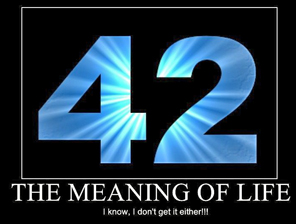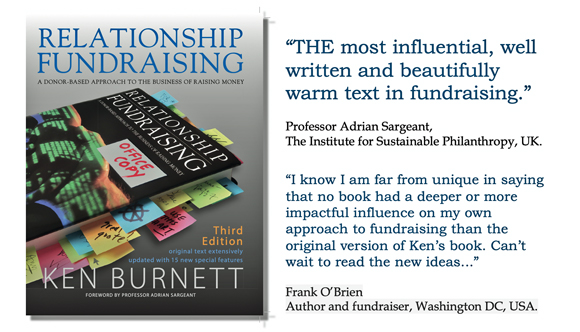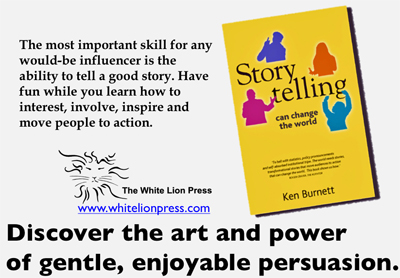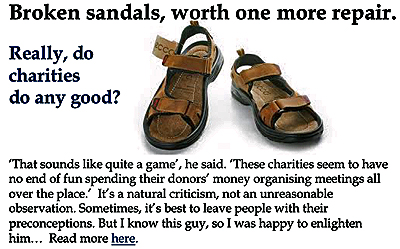|
|
This blog first appeared early in 2009 and, apart from adding a couple of links, hasn’t been changed since. But please see also my 2014/15 series on the same subject – the future of fundraising. ‘My fundraising strategy for the future (if I had to write one) would be built around thanking donors effectively.’ ‘Wise and smart fundraisers will be in the minority, but will be much more successful.’ ‘Learn to package and present passion, anger and thrill so that they combine to inspire and engage.’ For a chance to explore Bernard Ross’s project click here. More blogs on fundraising and communication Tales from The Field by the River: And also a special Visit SOFII for more from Ken Burnett: |
Bernard Ross from =mc recently asked my views on the above theme for a project he was organising. His email arrived at the end of a busy week with more of the same ahead. So I thought, ‘I either do this right now, or it won’t get done’. An hour or so later he had what’s below. I did cheat a bit, answering only one of Bernard’s three questions. It strikes me now that I could fine-tune and polish my response, but I won’t. At times we are best served by just saying what we think. I would value your views though, so please email me with your comments. Not to be entirely negative, I have added some positive suggestions at the end. Question 1: How will donors be different in 2020 and how will they be the same? The answer, of course, is ‘Well, it depends...’. It depends principally on whether fundraisers will get clever and start building more substantial, more meaningful relationships with their donors, offering them more tangible benefits and practical engagement. Or whether, instead, they will continue the same old current paradigm of thinly veiled hard sales tactics ineptly and only partly screened by a so-called ‘relationship fundraising’ approach. This of course results in the shallow, superficial relationships that most fundraising organisations have with their donors today. As I’m an idealist I’ll opt for what I predict might happen if a few farsighted fundraisers wise up. Let me start with some assumptions. Technology is rapidly changing fundraising communication and this will continue for the next 11 years at least. We might learn to distinguish between useful change and distracting change, but I doubt it. As a result of some of these changes though, donors have gained and will gain increasing control of our means of communicating with them, despite a proliferation of channels. Donors are unlikely to become more trusting and docile, rather they will increasingly seek accountability and transparency as well as control of where their money goes and value for their money. Generally donors’ motivations for giving, complex though these are, won’t change much. Some fundraisers though will get better at understanding these motivations and at responding creatively to them. Some fundraisers will get better at calculating and estimating lifetime values and so will realise the benefits of not focusing constantly on quick hits and the short term. Smart fundraisers will recruit only trained communications professionals and will invest in building the communication skills of their staff. Smart fundraisers will realise that successful communication is not about what they want to say or how they say it but rather about what donors are prepared to hear and how cleverly fundraisers can present that. With luck, the curse of assumptions will be driven from our halls. Wise fundraisers will listen better and will judge their responses better. Wise and smart fundraisers, needless to say, will be in the minority, but will be much more successful. The emphasis will be on the donor experience: ‘experience fundraising’, as I once called it. Real, useful, regular feedback will be one part of the key to this, consistent, informative, welcome and produced to a very high standard. This feedback will be combined with a creative and carefully constructed, even tailor-made, thank-you policy that constantly reminds donors of what a great thing they are doing from their point of view. My fundraising strategy for the future (if I had to write one) would be built around thanking donors effectively. The whole thing, of course, will be built upon more imaginative, more creative and better use of data. Fundraisers will wake up to the fact that they are selling neither their organisations nor their causes, nor their missions and certainly not all the nuts and bolts and insignificant minutiae of what they do. Rather they are promoting joy, the warm glow, the exhilaration, the sense of achievement and fulfilment, even the meaning of life. As business life and political life are so discredited now, the timing for all this could not be better now. Charities will also realise that to do this effectively they have to be very good indeed and they will need to employ fundraising professionals who are very good indeed too (so can demand very good conditions of employment). This all requires an approach to fundraising that individuals and their organisations will live, day in day out, not just talk about at conferences. Most fundraisers of course will not make this leap so most donors will continue to be just as uninspired by charities and the people that work for them as they are today. They will continue to be pissed off by them just as frequently too. So, another interesting decade, then. Addendum: PS. Bernard’s questions two and three As, for me, markets and technologies (the ‘where’ and the ‘with what’) seem much less important for charities than do donors and fundraisers, I’ll restrict my response to question one. It is the biggie. Having thought about it, there are of course a few things I might add. But beyond the hopefully helpful suggestions listed opposite, I think I'll stick with my instant reaction. © Ken Burnett 2009 Ken Burnett’s books on fundraising and communication include the classic Relationship Fundraising: a donor-based approach to the business of raising money and The Zen of Fundraising. For information, click here. Ken’s latest book Storytelling can change the world, published 2014, is linked opposite. 2015. Update on an opportunity turning into a crisis. 2017. The Commission on the Donor Experience is now planning how that change might happen. See here, plus all other CDE related blogs, here. In fact, the entire output from the Commission on the Donor Experience is now available, free, for you to download on SOFII. See here. Home page | Current blogs | Article archive
And don’t miss SOFII’s letter to the future, see here.
|
Some suggestions for things to do, not just starting tomorrow but until the end of time, or until you retire, whichever comes first. 1. Learn to really see what you do as if through your donor’s eyes. Cultivate and teach this obvious but rare talent in all your donor-facing colleagues. Practice this together until you really mean and walk the relationship talk. 2. Make sure you and your people are the most learned fundraising team in the land. Don’t just collect all the best books and attend the best seminars, use them, challenge them, revisit and refresh them constantly. 3. Get real. Study how Pareto’s brilliant principle – the 80:20 rule – affects your organisation. Then focus your attention and scarce resources on where you can make the most difference. 4. Develop strategies for building the trust of your donors. Practice transparency, accountability and consistency and promote these openly. Always keep your promises, and show that you have and do. 5. Become a master of technology, particularly all the new channels of communication. But impress on everyone that technology is a means to an end, not the end itself. 6. With this technology, learn to be a really effective communicator. Become brilliant at the art of storytelling. Take no prisoners: if it isn’t really good, don’t send it. 7. Write frequently to each of your donors about their very most favourite subject – themselves. Learn to package and present passion, anger and thrill so that they combine to inspire and engage. 8. Think long and deep about the feedback you could provide to show tangibly what donations to your organisation achieve. Plan your feedback to be personal, engaging, positive, varied and regular. 9. Install a thank you and welcome programme that’s at least as good as the best of all the others you’ve studied, from around the world. 10. Meet with and really listen to your donors, at regular intervals. 11. Ask vigorously, unashamedly and often. But always taking account of the relative comfort of your donors. If you are to ask your donors for the right things at the right time in the right way, you will need to know your donors very well and to prepare really thoroughly. Intuition and empathy will also help. 12. Make it as easy as possible for donors to recommend and introduce your cause to their family and friends. Not by promoting your organisation, but by circulating and sharing their experience and sense of fulfilment. See also my five-part 2014/15 series on the same subject – the future of fundraising. More Ken blogs on fundraising and communication (plus, see opposite). Ken Burnett’s latest book Storytelling can change the world is reviewed here and here and you can buy it here. You can visit the Online Story Bank for free, click here.
|








